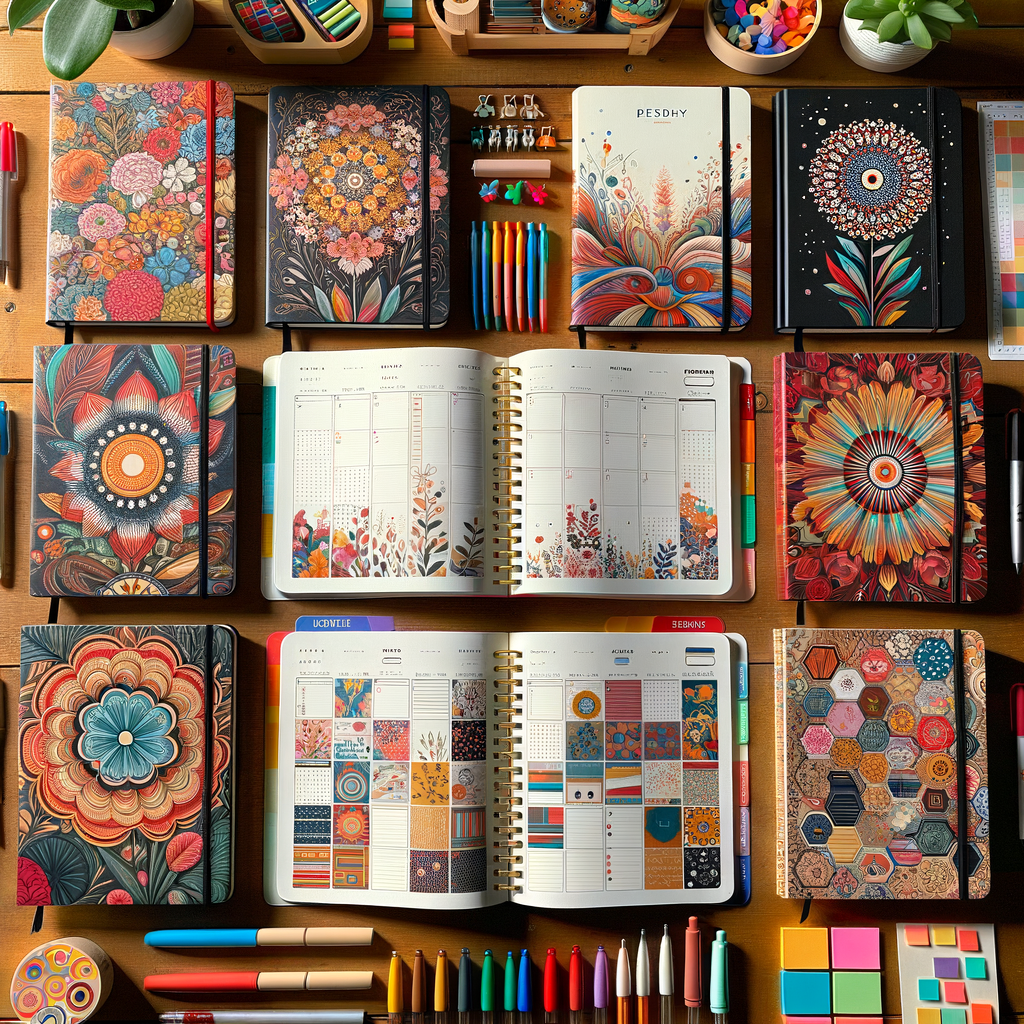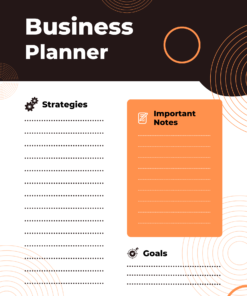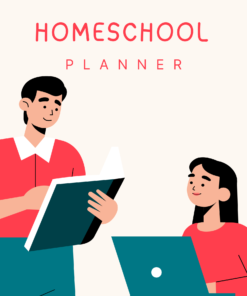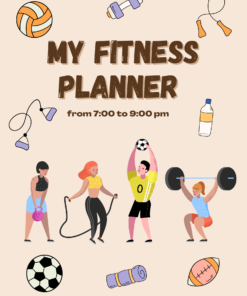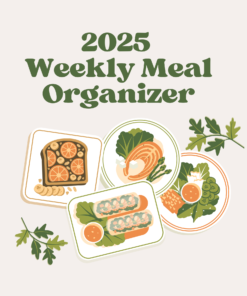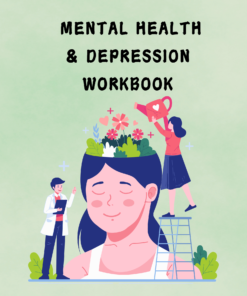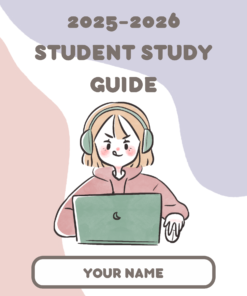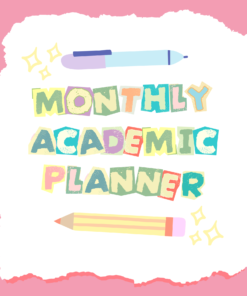Types of Planners
Empowering Kids Through Education Planners: Boosting Growth, Resilience, and Focus
Organization and strategic planning play a crucial role in a child’s growth and education. Creating a structured environment helps children learn, develop essential skills, and manage time efficiently throughout their academic journeys.
Kids and education planners are essential for creating structured learning experiences. They help organize educational activities, ensuring that kids receive a well-rounded education tailored to their developmental needs.
A well-organized approach fosters independence and confidence, empowering children to take charge of their educational experiences and personal development.
Families can create a supportive framework that encourages academic achievement and character building by integrating planning tools into their daily routines, setting the foundation for lifelong success.
Transformative Power of Kids and Education Planners for Children and Parents
Planners can serve as transformative tools for children and parents, facilitating a harmonious balance between academic responsibilities and personal development.
Using planners helps children cultivate essential skills such as time management, organization, and goal-setting. By visually mapping out their tasks and commitments, children learn to prioritize their responsibilities, leading to increased accountability and independence.
This structured approach not only reduces anxiety by breaking down larger projects into manageable steps but also instills a sense of control and empowerment in children, providing parents and educators with reassurance and confidence.
For parents, planners provide a framework to nurture their child’s educational journey while maintaining oversight and support. Parents can seamlessly engage in their child’s learning process by coordinating schedules, setting family goals, and making progress.
This collaborative approach not only strengthens family bonds but also empowers parents to be proactive in addressing challenges or celebrating achievements. Using planners creates an environment where children and parents thrive, paving the way for a successful educational experience and personal growth.
Introducing a Collection of Planners for Kids
In response to the growing need for effective organizational tools tailored for children, we are excited to introduce a unique collection of planners specifically designed to enhance their educational journey and daily routines.
These planners offer a delightful blend of functionality and creativity, providing children an engaging way to manage their tasks, set goals, and reflect on their progress. Each planner is thoughtfully crafted to cater to various age groups and learning styles, ensuring every child can benefit from these resources.
By integrating features such as colorful layouts, motivational prompts, and flexible scheduling options, these planners not only empower kids to take ownership of their education but also bring a sense of joy and engagement, fostering an optimistic outlook in parents and educators.
The Importance of Planners in Kids’ Education
Planners are invaluable tools that assist children in developing essential skills such as time management, goal setting, and self-discipline. Regularly using a planner, children learn to allocate their time effectively, distinguishing between short-term tasks and long-term projects.
This practice encourages them to prioritize their responsibilities, which is crucial for managing homework, extracurricular activities, and personal commitments.
When children write down achievable objectives in their planners, goal setting becomes integral to their learning experience. This visual representation of their goals fosters a sense of accountability and motivation to stay on track. As children progress, they can reflect on their achievements, build confidence, and adjust their plans for continuous improvement.
Planners instill self-discipline by creating a structured framework for children to manage their time and commitments. They consistently follow their schedule and cultivate habits that promote responsibility and organization. Over time, these skills enable children to navigate their academic environments with greater ease and prepare them for future challenges in both academic and personal settings.
Positive Impact on Academic Performance, Stress Reduction, and Overall Development
Integrating planners into children’s educational routines yields many benefits that positively influence their academic performance, promote stress reduction, and foster overall development.
Firstly, by providing a clear framework for managing tasks and deadlines, planners enhance students’ ability to keep track of assignments and projects, leading to improved grades and a greater sense of accomplishment. When children can visually see their commitments laid out, they are more likely to adhere to deadlines and maintain focus on their studies.
Planners are crucial in reducing stress and anxiety often associated with school-related pressures. By breaking down daunting tasks into smaller, manageable steps, children can confidently approach their responsibilities, alleviating feelings of overwhelm.
This proactive management of their workloads fosters a calmer mindset, allowing them to engage more fully in their learning experiences.
Planners encourage essential life skills beyond academics. By promoting organization, time management, and goal-setting, children cultivate a strong foundation for success in various areas of life.
These skills empower them to easily navigate their educational journeys and prepare them for future challenges in their professional and personal endeavors.
Featured Planners and Their Unique Benefits
This section will delve into our carefully curated selection of planners designed specifically for children. Each planner in this collection offers distinct features and benefits that cater to the diverse needs of young learners.
By highlighting the unique attributes of these planners, we aim to illustrate how they can effectively support children in their educational journey while making the organization an enjoyable and creative process.
From vibrant designs that spark joy to functional layouts that encourage productivity, these planners are not just tools but companions in fostering lifelong skills. Let’s explore the transformative potential of each featured planner and discover how they can enrich children’s learning experiences.
- Exercises for Emotional Regulation: This planner includes a variety of exercises designed to help children identify their emotions and implement healthy coping strategies. Techniques such as deep breathing, visualization, and grounding exercises are incorporated to empower kids to manage their feelings effectively in challenging situations.
- Space for Reflections: Each week, children are given dedicated space to reflect on their positive and negative experiences. This reflective practice encourages them to think critically about their emotional responses, enabling them to learn from their interactions and decisions. It helps nurture self-awareness and emotional intelligence, vital skills for personal development.
- Calming Activities: The guide features fun and engaging calming activities, such as doodling prompts, mindfulness exercises, and nature observation tasks. These activities are designed to provide children with tools to relax and center themselves during moments of stress. By integrating these calming techniques into their daily routines, children learn to cultivate inner peace and resilience, enhancing their overall well-being.
Benefits: Highlight the Enhanced Ability to Manage Stress and Focus, Promoting Emotional Well-Being and Resilience
Utilizing planners can significantly enhance children’s ability to manage stress and maintain focus, pivotal components of emotional well-being and resilience. With the structured approach that planners provide, children can break down overwhelming tasks into smaller, digestible segments, which promotes a sense of control over their workload.
This reduces anxiety associated with looming deadlines and fosters a proactive mindset, encouraging children to confidently tackle their responsibilities.
Moreover, by incorporating regular check-ins and reflection periods into their planning routine, children can assess their emotional states and adapt their strategies accordingly.
This mindfulness practice reinforces their ability to stay present and engaged, mitigating distractions that often lead to stress.
Over time, the skills gained from effectively using a planner—prioritization, time management, and self-regulation—contribute to a robust foundation for emotional resilience, allowing children to navigate challenges more easily and adapt positively to changing circumstances.
Kids Journal
- Prompts for Daily Entries: This journal has engaging prompts encouraging children to express their thoughts and feelings daily. By guiding them to reflect on their experiences, from simple moments of joy to challenges they overcame, these prompts help foster a habit of self-reflection and mindfulness.
- Creative Expression: The journal includes sections for doodling, drawing, or writing stories, allowing children to unleash their creativity. This creative outlet makes journaling enjoyable and serves as a therapeutic process, enabling kids to articulate their emotions and ideas in a visual format.
- Gratitude Practice: A dedicated space for gratitude entries encourages children to focus on the positive aspects of their lives. By prompting them to identify and write down things they are thankful for each day, this practice cultivates a sense of appreciation and positivity, promoting overall emotional well-being. Writing about gratitude has been shown to enhance happiness and foster resilience, offering children a powerful tool to nurture a positive mindset.
Focus on Nurturing Creativity, Self-Reflection, and Positive Thinking in Children
Encouraging creativity, self-reflection, and positive thinking in children can have profound and lasting impacts on their development. Incorporating tools like journals and planners into their daily routines fosters an environment where creative expression can flourish.
By allowing children the freedom to draw, write, or brainstorm without restriction, these tools invite imaginative thinking and problem-solving skills, which are crucial in academic and real-life scenarios.
Moreover, regular self-reflection practices cultivate mindfulness and emotional intelligence, enabling children to process and learn from their experiences. This habit of introspection encourages them to evaluate their thoughts and feelings, leading to greater self-awareness and a deeper understanding of their emotional responses.
As they gain insight into their personal journeys, they also learn to appreciate the importance of positive thinking. Children develop resilience and an optimistic outlook by focusing on gratitude and the positive aspects of their lives, equipping them with a valuable mindset to serve them throughout their lives.
This holistic approach nurtures their current well-being and lays the foundation for future success in both personal and academic pursuits.
Daily Use: Practical Ways to Incorporate Planners into Daily Routines
Integrating planners into children’s daily routines can significantly enhance their organization and learning skills. One effective method is establishing a daily planning session, ideally in the morning or before bedtime, where children can review their tasks and set priorities for the day ahead.
This practice fosters a sense of responsibility and helps them visualize their schedule, making it easier to manage their time effectively.
Children can use color coding for different subjects or activities, creating a visual cue to aid memory retention and add fun to their planning.
Encouraging them to break down larger projects into smaller, actionable steps in their planners can also streamline their approach to school assignments. Integrating weekly goals or to-do lists promotes accountability and allows children to celebrate accomplishments.
Finally, a designated check-in time during the day, where they assess their progress and adjust their plans as needed, can reinforce adaptability and self-regulation, ultimately leading to enhanced learning outcomes.
Goal Alignment: Aligning Planner Use with Educational and Personal Growth Goals for Children
Aligning planner use with educational and personal growth goals is essential to maximizing their effectiveness in children’s daily routines. First, children must set specific, measurable, achievable, relevant, and time-bound (SMART) goals relating to their academic performance and personal development.
By incorporating these goals into their planners, children can regularly track their progress and adjust their strategies, fostering a proactive approach to their education and growth.
To support this alignment, parents and educators can guide children in identifying short-term and long-term goals, ensuring they understand the distinction and significance of each.
For instance, a child may set a short-term goal to complete homework assignments on time. In contrast, a long-term goal might focus on improving grades in a challenging subject.
Visualizing these goals in their planners helps children develop a clearer sense of direction and purpose.
Incorporating reflective prompts into their planning routine can help children assess their progress toward these goals. Regular reflection on accomplishments and challenges enables children to learn from their experiences, refine their goals, and maintain motivation.
Such goal-oriented planning enhances their organizational skills and fosters resilience and a growth mindset as they learn to navigate obstacles and celebrate their achievements.
Motivate Parents and Educators
As parents and educators, your role in shaping children’s educational experiences is invaluable. Introducing planners into their daily routines can empower young learners to take charge of their organization and personal growth.
Encourage children to embrace the habit of planning by providing them with age-appropriate planners that inspire creativity and tailored design.
Take the initiative to guide them through setting goals, reflecting on their progress, and celebrating their achievements. Create a supportive environment where discussions about planning become a regular practice.
Doing so fosters important life skills that will benefit them academically and nurture resilience, creativity, and positive thinking. Let’s work together to cultivate a generation of organized, reflective, and empowered individuals ready to navigate their educational journeys confidently!
You might be interested in exploring more about the importance of organization in education. Speaking of this, you can delve deeper into the concept of time management, which plays a crucial role in helping children balance their academic responsibilities with personal interests. Additionally, learning about self-regulated learning can provide valuable insights into how children can take charge of their educational journeys by setting goals and tracking their progress. Finally, understanding the principles behind mindfulness can further enhance your approach to fostering resilience and emotional well-being in children, helping them navigate the ups and downs of their academic lives.

